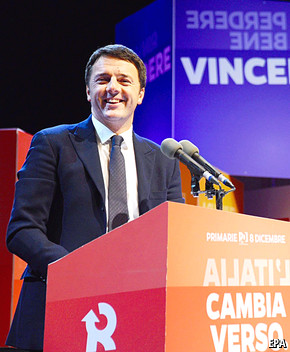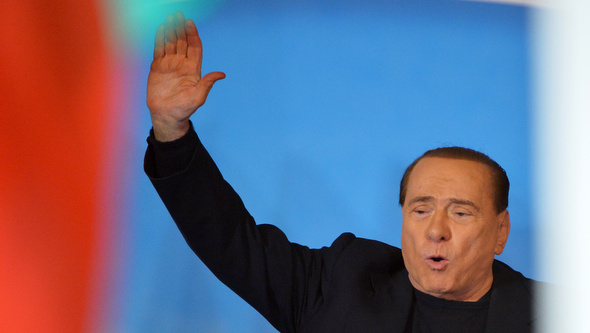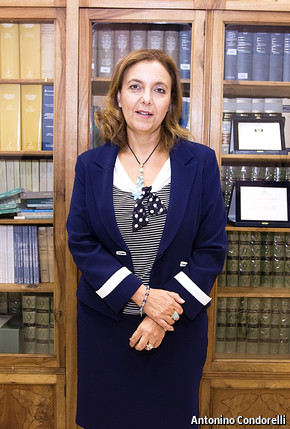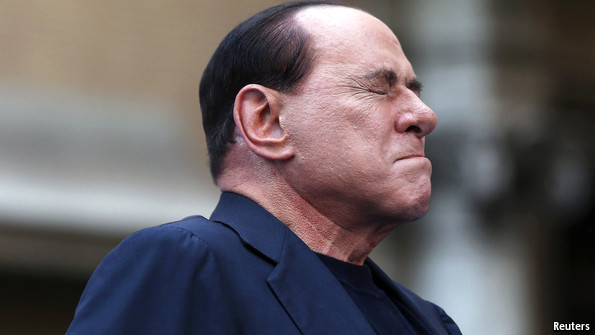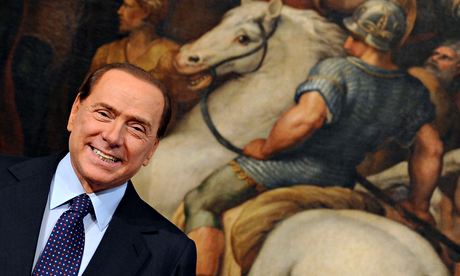
Silvio Berlusconi will shortly find out how he will serve his tax fraud sentence.
Photograph: Ettore Ferrari/EPA
More than eight months after he was given his first definitive conviction in the Italian courts, Silvio Berlusconi is due to find out how he will serve his one-year sentence for tax fraud.
At 77, the former prime minister is past the stage where he could be sent to prison for such a crime. So the question is whether Milan's Tribunale di sorveglianza, which is due to hear Berlusconi's case on Thursday and will have five days to issue a verdict, will opt to place him under house arrest or decide that he should be "entrusted to social services".
The billionaire media tycoon, who is still the leader of Italy's biggest centre-right party and continues to play a huge role in the country's politics, is hoping against the former because of the drastic impact it would have on his freedom of movement.
The alternative is hardly the stuff of a former statesman's dreams, though. According to the Italian Catholic newspaper Avvenire, probation officers in Milan have recommended that the court – should it opt for community service – order Berlusconi to work one day a week, morning or afternoon only, caring for the elderly and disabled at a home near Milan.
Such a task would surely not be too onerous for the former premier, whose only other requirements would reportedly be to be at home by 11pm every night and not leave again until 6am.
The recommendation is non-binding and the care home is far from the only place to have expressed interest in accommodating the rehabilitation needs of Italy's most famous condannato. Four would-be employers – critics and defenders of Berlusconi – have spoken to the Guardian about how they could help him on his journey of redemption.
A life of reflection
Don Antonio Mazzi has a mission for Berlusconi: "the dismantling of his 'personality'". At Exodus, an NGO that specialises in rehabilitation and reeducation programmes, the 84-year-old priest has a special programme for high-profile guests that revolves around self-reflection and "disciplined activity – as if they were normal Christians, not extraordinary people".
"They get up at 6.30am," he explains. "They do sporting activities like everyone else. Then there's breakfast and then they go and clean the bedrooms. They do five hours of work until 1pm." In the afternoons, Berlusconi would see a psychologist, or work on an obligatory journal. "The main work is reflection, a minimum amount of discipline and above all the dismantling of the 'personality' in order to let the person emerge," says Mazzi. "And it works."
A shining example of this, he says, is none other than Lele Mora, a former talent scout who was found guilty last year of procuring prostitutes for Berlusconi's bunga bunga parties. (He denies the charges and is appealing against the first-grade conviction.)
Following a previous conviction for bankruptcy fraud, the 59-year-old has been doing community service with Exodus since September 2012. Photographs have emerged in the press of a dishevelled-looking Mora gardening and manning a bric-a-brac stall in Milan.
"He comes two days a week and does voluntary work," says Mazzi. "That's why I say the system works, because he is very changed from a personal point of view. He is very committed. And those two [Mora and Berlusconi] knew each other well.
"I have to say that tranquillity, reflection and the progressive dismantling of the personality works at all ages." Including Berlusconi? "I don't know," he says, and laughs.
Learning how to become a clown
When, last year, Berlusconi was described by news outlets and a German politician as a "clown", Giovanni Savino was offended. As a real clown, he doesn't appreciate what the former prime minister has done to the profession's reputation.
Savino is the chairman of Il Tappeto di Iqbal (Iqbal's Carpet), an NGO operating in the mafia-dominated Naples neighbourhood of Barra to teach local children the art of the circus, and aims to show them an alternative path in life, or at least a social structure that is not the camorra.
He has lodged an official request for Berlusconi to be entrusted to his care for community service. "As the whole world knows him as a joker, and maybe it's the only thing he still knows how to do, he can come and tell jokes to the children of Barra," he says. "As [he] has these characteristics, it seemed to me interesting to offer him this opportunity."
Just last week, the former head of Berlusconi's old party in the region surrounding Naples, Nicola Cosentino, was arrested on suspicion of colluding with the mafia to favour his family business, allegations his lawyer has described as absurd.
For Savino the road to redemption for Berlusconi is clear. "If he used Italy for 20 years for his own purposes, for once I want it to be me who uses him for the purposes of the children of Barra," he says.
Looking after animals
In recent months a new player has emerged on the Italian political scene, and he goes by the name of Dudù. In the search for a new and susceptible electorate for Forza Italia, Berlusconi has sought to rebrand himself as a champion of animal rights, pushing new policies to help abandoned pets at the same time as posting photographs of him and Dudù, his pet dog. Whatever he makes of the new promises, Lorenzo Croce, chairman of the Italian association for the defence of animals and the environment (AIDAA), doesn't see why Berlusconi shouldn't build on them to "send a message" to the Italian public.
AIDAA has outlined three options for Berlusconi: the first would see him feeding abandoned kittens, the second working with horses, and the third with the rescued animals on a farm its runs near Milan. "To me it doesn't matter what he's done or not done. That's for the judiciary to decide," says Croce. "He is, regardless, an Italian political leader, and he could in these months dedicate his leadership to the service of something concrete." As an extra carrot, AIDAA is offering Berlusconi food, bed and bath thrown in.
Social services with the priesthood
Last August, in the days following his tax fraud conviction, Berlusconi was made an offer by Don Valentino Porcile, a priest in the north-western city of Genoa. "Will you come to serve your sentence with me?" he asked in a quietly angry letter. "I'll do you a nice little programme of socially useful services. I'll take you on a year of continuous trips … for ten hours a day to see real poverty."
Eight months later, Porcile – who, despite his criticisms, is not unsympathetic to Berlusconi and says he is the victim of a unique judicial "rage" – is still just as keen to receive him. What began as a "provocation", he says, has fused into a real desire to show not just the Forza Italia leader but all politicians the real world as it is.
"It is not just him. I think the whole political class – right, left, all of them - don't truly understand how people are living in despair," he says. "So many politicians – including on the left – do not understand how it is for people. So they should come and see how things are for people on the ground. People are not doing well. They are worn out by the crisis."
